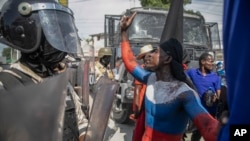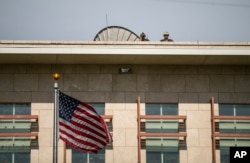Haiti’s foreign minister appealed to the U.N. Security Council Monday to assist his country, where he said the situation has “dangerously deteriorated” in the past month as insecurity worsens and cholera has reemerged.
“I have the sensitive mission of bringing to the Security Council the distress call from the entire people, which is suffering, and to say loudly and clearly that the people of Haiti are not living, they are surviving,” Jean Victor Geneus told a meeting of the 15-nation council.
He said the Caribbean Island nation is dealing with major security, political, economic and social challenges.
“Every day, human lives are lost. There are kidnappings, public and private property is destroyed. There are rapes, theft, looting, threats and intimidation,” Geneus said. “This plunges the country further into the chaos with extremely serious consequences for all of the people. Now we also have the resurgence of cholera.”
U.N. Secretary-General Antonio Guterres is urging the international community to respond to a request from Haiti’s government and consider sending an international specialized armed force to address gang violence, which has paralyzed the country and deepened the humanitarian crisis.
“I believe that we need not only to strengthen the police — strengthening it with training, with equipment, with a number of other measures — but that, in the present circumstances, we need an armed action to release the port and to allow for a humanitarian corridor to be established,” Guterres told reporters Monday at U.N. headquarters.
Nightmare situation
Heavily armed gangs control parts of the capital, Port-au-Prince, and have blocked access to the country’s main fuel terminal since mid-September. This has worsened the already abysmal humanitarian situation affecting the availability of electricity, clean water, garbage collection and the ability of hospitals to operate.
The United Nations estimates that 1.5 million people have been directly affected by gang violence, and 20,000 have fled their homes seeking safety.
“It’s an absolutely nightmarish situation for the population of Haiti, especially Port-au-Prince,” Guterres told reporters.
The government of Prime Minister Ariel Henry has requested the immediate deployment of an international specialized armed force to help stop the gangs, which are seeking to exploit the political vacuum left by the July 2021 assassination of President Jovenel Moise.
In a 12-page letter to the Security Council on October 8, the U.N. chief laid out his vision for a bilateral rapid action force — using Haiti’s National Police and troops from “one or several” other nations — not a U.N. peacekeeping mission. Diplomats say Guterres is mainly looking to the United States and Canada to step up.
Council action
Council members Mexico and the United States have been drafting two resolutions for the council to consider.
“The first resolution would impose financial sanctions on criminal actors that are inflicting so much suffering on the Haitian people,” U.S. Ambassador Linda Thomas-Greenfield said. “It is time to hold them accountable for their actions.”
The resolution would target with asset freezes and travel bans those responsible for gang violence, arms trafficking, kidnappers and human rights abusers. It would also hold accountable those who block Haiti’s ports and the delivery of humanitarian aid. Additionally, it would impose an arms embargo on the transfer or sale of weapons to gangs and their leaders.
“The draft resolution specifically lists Jimmy Cherizier – also known as 'Barbeque' – as the subject of such sanctions,” Thomas-Greenfield said. “He is directly responsible for the devastating fuel shortage that is crippling the country. By passing this resolution, we would take concrete actions to hold him – and so many other violent criminals – to account.”
The second proposed resolution would address the Haitian request and the secretary-general’s recommendation, authorizing an international security assistance mission to help improve security and enable the movement of humanitarian aid. U.N. member states would be asked to contribute personnel, equipment and other resources to this non-U.N. mission.
“The debate on sanctions has taken off,” reported Helen La Lime, the U.N.’s representative in Haiti.
“Haitians are actively using both social media and radio debates to express support for serious targeted sanctions against those who are driving violence to prevent changes that threaten long-standing patterns of corruption,” she told the council in her video briefing from Haiti.
Council members expressed broad support for both resolutions. However, Russia’s envoy expressed reservations, making a swift vote less likely.
If adopted, they would be the first new council sanctions on Haiti in five years.
Grim humanitarian situation
Life for Haitians, particularly in the capital, has become increasingly dangerous. The U.N. says 60% of Port-au-Prince is reportedly under gang-control or influence.
A joint report published Friday by the U.N. mission in Haiti, known by its acronym BINUH, and the U.N. human rights office found that children as young as 10 and elderly women have become victims of sexual violence, including “collective rapes for hours” in front of their relatives by more than half a dozen gangs.
Nearly a thousand kidnappings have been reported this year. The report found that abductors have used recorded videos of rapes to coerce victims’ families to pay ransoms.
Insecurity is exacerbating Haiti’s food security. The latest Integrated Food Security Phase (IPC) report published Friday says there is an unprecedented 4.7 million people — nearly half the population — experiencing emergency levels of acute food insecurity, including 19,000 people in Phase 5 Catastrophic hunger.
On top of this, after nearly three years without a case of cholera, the country is facing the return of the waterborne disease due to fuel shortages that have led to power cuts, a lack of clean drinking water and poor sanitation.
As of Saturday, the Ministry of Health had confirmed 66 cases, reported 564 suspected cases and 22 cholera-related deaths. Most of the suspected cases have been recorded in the Port-au-Prince metropolitan area, but the U.N. says there are also cases in the Centre, Nippes and Artibonite treatment facilities.
Cases at the Port-au-Prince prison are counted separately. Health authorities have confirmed 12 cholera cases and 14 deaths, and nearly 300 suspected cases.
After the 2010 earthquake, a cholera epidemic ravaged the country infecting more than 800,000 people and killing an estimated 10,000. The outbreak was traced to sewage from a U.N. peacekeeping camp that contaminated a main water supply. It took the U.N. six years to admit its role in the epidemic.





